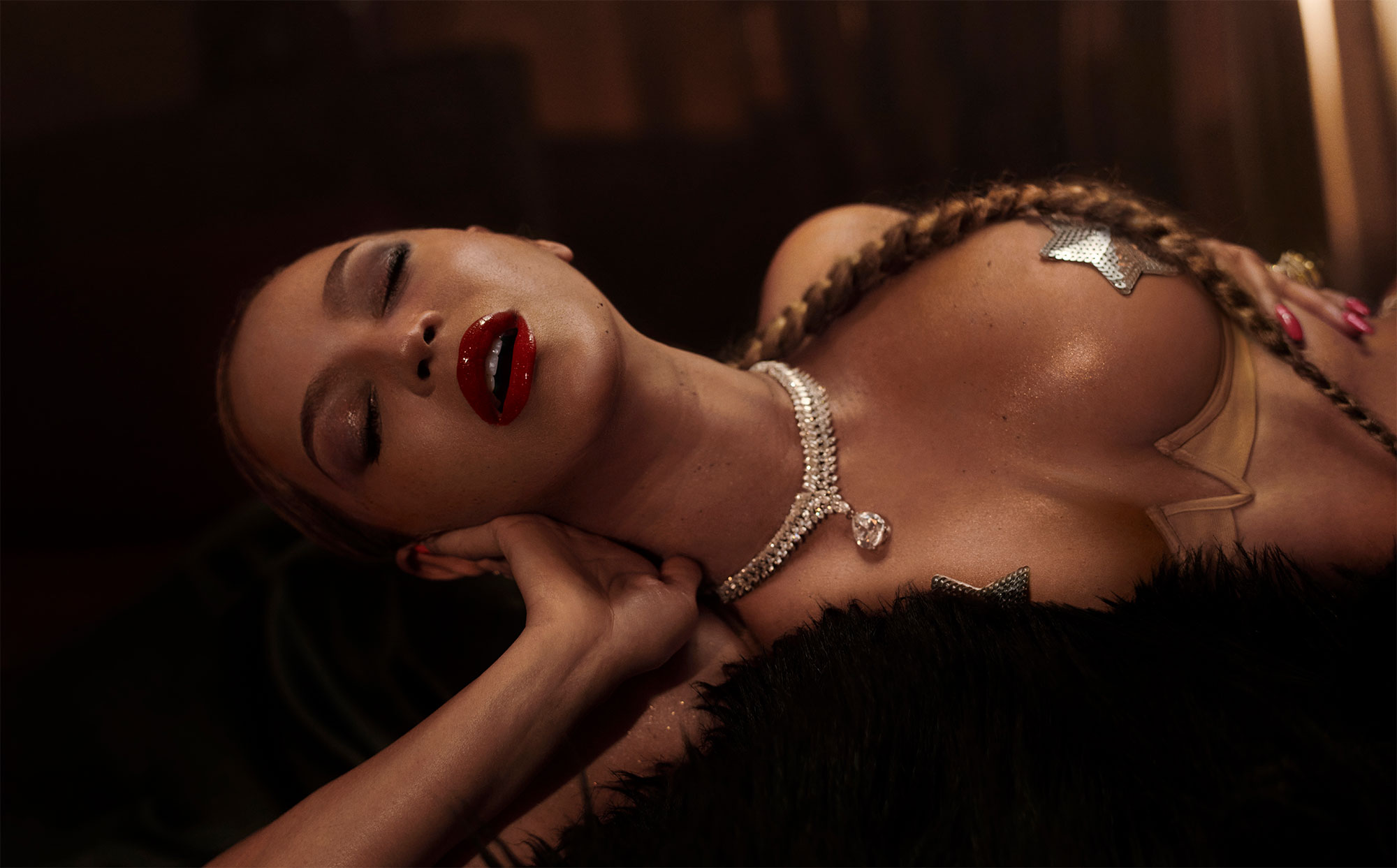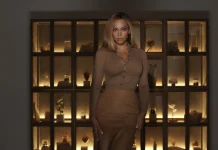Her seventh album’s quaint grandeur feels stunningly cutting-edge
But since her eponymous 2013 album, Beyoncé’s career trajectory has gone in something like the opposite direction: She leveled up from her early conciliatory yet impeccable overtures to the mainstream — found on 2006’s B’Day and 2008’s I Am … Sasha Fierce — and began releasing adventurous projects whose rollouts were more inventive than a Donald Glover teleplay. On her 2016 masterpiece, Lemonade, Beyoncé gifted us with a stunning “visual album” that was at the vanguard of Black contemporary art — an aural analog to curator Kimberly Drew’s beloved Tumblr theme around Black artists. It inspired a university syllabus and lit up the streets as well. Beyoncé, in short, made progressiveness go pop.
Most captains of industry with roughly the same net worth as Bey will tell you that coolness doesn’t scale — you can’t do Kmart numbers if the very “it” factor to your boutique brand is owed to its exclusivity. But everything about the way Beyoncé has been releasing albums for close to a decade now appears geared toward making music even your grandmother is up on, that, just the same, feels as arty and ultramodern as some limited-edition collab you need a small army of bots to help you secure in an online shopping cart. It’s an impossible square-peg-in-a-round-hole predicament that Beyoncé subverts every time, making the warring dichotomies the best fit for the culture since snark and social media.
Beyoncé’s latest album, Renaissance, which was announced weeks in advance, along with a major Vogue cover story, and is being released in four box sets and limited-edition vinyl, finds her creating an upbeat collection of hits, boundary-expanding deep cuts, and cozy ballads, whose quaint grandeur feels starkly cutting-edge. And it happily suggests that the new wave for the iconic singer is to keep it kind of old school.
What first strikes you about Renaissance are its mellow atmospherics. Even some of the more uptempo cuts here showcase Bey’s mesmeric refrains in a mellifluous, low-key register, which feels noteworthy, seeing that some of her most iconic hits are throaty, melisma-drenched anthems, like 2011’s “Love on Top.” These 16 songs, which dabble in deep house, Afrobeats, and elegant early-Eighties boogie, stand out as playful relics of an analog era in which even the big dance-friendly singles felt as lush and organic as the introspective songs you could zone out to at home on a lazy afternoon.
On the languorous “Plastic on the Sofa,” Bey croons, “I love the little things that make you you,” over lilting bass and sunny guitars whose warm Seventies aura recalls peak Minnie Riperton. It’s a heartfelt ode to everything Beyoncé loves about being in love. And she sings with plain-spoken passion, confessing later on that “I think you’re so cool, even though I’m cooler than you,” while sounding flirty and down-to-earth, as if she’s just some regular woman enjoying her baecation, and not the most famous singer on the planet in a state-of-the-art home with multiple Basquiat paintings hanging on its walls. Her breathtaking vocal tics — the epitome of sprezzatura — add virtuosic verve to the track’s lolling vintage groove.
The occasional light touch showcased on the similarly chill opener, “I’m That Girl,” suits Beyoncé well. It’s a welcome contrast to the rushed, energetic vocal runs of her early days, which sometimes sounded a bit sterile, even when they were seductive. That said, “Pure/Honey” is a pulsing, vogue-friendly bop displaying some of Queen B’s most exuberant vocals, particularly toward the end of the track, where she blurts, in a shouty, gospel-tinged tone, “I put the sweet-sweet on your tongue, don’t it taste yummy?” reminding you of her place in the lineage alongside soul legends like Etta James and Tina Turner.
The former Destiny’s Child frontwoman has long been known for telling tales out of school, bringing legit gospel-style singing to the ratchet unwashed masses. On “Church Girl,” over No I.D.’s deconstructed boom-bap splicings of some old sanctified hymn, Beyoncé, like Prince, Marvin Gaye, and Brother Ray Charles before her, marries the sacred with the profane, affirming that “nobody can judge me but me,” then imploring both “church girls” and “bad girls” alike to “twirl that ass like you came up out the South.” There’s an unbeatable oomph to the song’s insistent trap bounce and too-Black-too-strong talking points, which makes it feel like some jubilant Juneteenth celebration — as alive and joy-filled as the segment in Bey’s 2019 concert film, Homecoming, where she and Solange break into old-school dance routines while being backed by an HBCU marching band.
On “Heated,” which shares a songwriting credit with Drake, Bey floats atop an exotic riddim, bragging that she’s “got a lot Benz, got a lot of Chanel on me,” then spits some of her hardest bars (“Monday I’m overrated, Tuesday on my dick/Flip flop flippin’, flip floppin’ ass bitch”), reminding us that, back in her Destiny’s Child days, she helped invent the whole sing-rap style that’s virtually everywhere these days. That aspect to her sound is what the aunties, who swear by gospel legends like Yolanda Adams and may have been otherwise intrigued by Bey’s church-bred timbre, couldn’t stand about her two decades ago. But she was that ahead of the curve. Her quick-fire delivery here is full of passion and pathos and is powerful AF.
Ditto for lead single “Break My Soul,” whose charged, four-on-the-floor percussion and cascading water-droplet synths — lifted from Robin S.’s 1990 hit, “Show Me Love” — fuel what’s sure to be a high-key motivational mantra. When Bey belts “I just quit my job/I’m gonna find my new drive,” the urgent, unrestrained elation in her voice is enough to make you want to start up a new hustle or go HAM during leg day at the gym.
Not everything is as rewarding on Renaissance, though. “Thique” is not exactly a misfire — you’ll see it do its work outside (and on TikTok, which the 40-year-old mother of three just joined) this summer. But for the woman who coined the actual Webster’s term “bootylicious” some 20 years ago, “Thique,” with its would-be salacious references to “that jelly, baby,” “that candy-girl piñata,” and “that oochie coochie la la” come off a tad trite, as if Beyoncé absentmindedly consulted some instant IG caption generator.
Also, there are no overtly socially conscious songs on Renaissance, and that might disappoint some fans who were rocked to their core hearing Beyoncé, on her moving, Kendrick Lamar–assisted “Freedom,” give voice to the injustices African Americans have been facing in this country for generations. Listeners who were inspired to see her throw up that Black Power fist, invoking Tommie Smith and John Carlos’ defiant salute at the 1968 Olympics, for the awe-struck audience at the 50th Super Bowl, might feel that she should continue to use her platform to bring light to these issues.
But with an artist as smart and subversive and intentional as Beyoncé, the personal is also political. And, anyway, it’s summer. The cleverly titled “America Has a Problem,” which samples from Atlanta rapper Kilo Ali’s 1990 song “Cocaine (America Has a Problem),” is a cool-as-the-inside-of-an-ice-cream-truck banger, driven by stark chords and jittery drums, wherein Bey talks up her addictive properties (”I’m-a make you go weak for me/Make you wait a whole week for me”), insinuating that when a bossed-up Black woman is as swaggy and on-point as she always is, that’s a threat to the very power structure in this country.
And who’s to say that the body-positive sloganeering in songs like “Thique” will not, at the same time, inspire scores of Black women and girls who don’t feel as though they’re reflected in the images promoted by the media? That Beyoncé, by simply bigging herself up, is speaking for them and acknowledging their agency, is important, even if we have some minor quibbles about the slang she adopts.
Is this an evolution from Lemonade? Not quite. But with Renaissance, Beyoncé is more relatable than ever, giving listeners all the anthems and sultry slow burners we love and have come to expect from her, proving that inclusivity is the new black.



